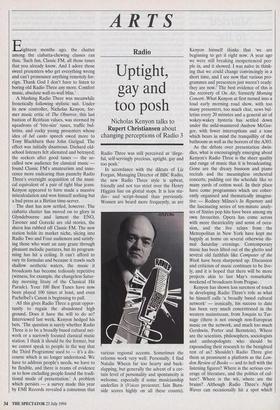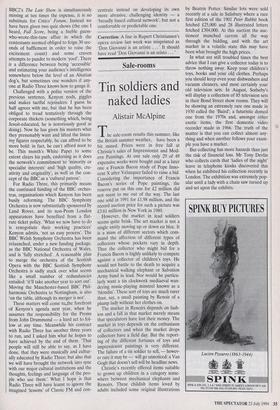ARTS
Radio
Uptight, gay and too posh
Eighteen months ago, the chatter among the ciabatta-chewing classes ran thus. 'Such fun, Classic FM, all those tunes that you already know. And I adore those sweet presenters who get everything wrong and can't pronounce anything remotely for- eign. Thank God I don't have to listen to boring old Radio Three any more. Comfort music, absolute wall-to-wall bliss.'
A blushing Radio Three was meanwhile frenetically following stylistic suit. Under its new controller, Nicholas Kenyon, for- mer music critic of The Observer, this last bastion of Reithian values, was stormed by squadrons of 'bite-size' tunes, traffic bul- letins, and cocky young presenters whose idea of bel canto speech owed more to Tony Blackburn than John Gielgud. The effect was initially disastrous. Diehard old- school listeners felt alienated and betrayed; the seekers after good tunes — the so- called new audience for classical music — found Classic FM's amateurism and inno- cence more endearing than paunchy Radio Three's overnight acquisition of the musi- cal equivalent of a pair of tight blue jeans. Kenyon appeared to have made a massive miscalculation and won himself nothing but a bad press as a Birtian time-server.
The dust has now settled, however. The ciabatta chatter has moved on to glory in Glyndebourne and lament the ENO, Tavener and Gorecki are old stories, the sheen has rubbed off Classic FM. The new station holds its market niche, slicing into Radio Two and Four audiences and satisfy- ing those who want an easy graze through pleasant melodic pastures, but its program- ming has hit a ceiling. It can't afford to vary its formulas and because it trawls such shallow aesthetic waters, the music it broadcasts has become tediously repetitive (witness, for example, the changeless Satur- day morning litany of the Classical Hit Parade). Your 100 Best Tunes have now been played 100 times at least, and even Pachelbel's Canon is beginning to pall.
All this gives Radio Three a great oppor- tunity to regain the abandoned high ground. Does it have the will to do so? Interviewed last week, Kenyon hedged his bets. 'The question is surely whether Radio Three is to be a broadly based cultural net- work or a narrowly focused classical music station. I think it should be the former, but we cannot speak to people in the way that the Third Programme used to — it's a dis- course which is no longer understood. We have to address people's needs, we have to be flexible, and there is reams of evidence as to how excluding people found the tradi- tional mode of presentation.' A problem which persists — a survey made this year by EMI Records revealed a consensus that Radio Three was still perceived as 'dirge- ful, self-servingly precious, uptight, gay and too posh.'
In accordance with the diktats of Liz Forgan, Managing Director of BBC Radio, the new Radio Three style is upbeat, friendly and not too strict over the Henry Higgins line on glottal stops. It is less stu- dio– and script–bound than previously. Women are heard more frequently, as are various regional accents. Sometimes the reforms work very well. Personally, I find Natalie Wheen far too hearty and back- slapping, but generally the advent of a cer- tain level of personality and spontaneity is welcome, especially if some musicianship underlies it (Voices presenter, lain Burn- side scores highly on all these counts). Kenyon himself thinks that 'we are beginning to get it right now. A year ago we were still breaking inexperienced peo- ple in, and it showed. I was naive in think- ing that we could change convincingly in a short time, and I see now that various pro- grammes and presenters just weren't ready: they are now.' The best evidence of this is the recovery of On Air, formerly Morning Concert. What Kenyon at first turned into a loud early morning road show, with too many presenters, too much chat, news bul- letins every 20 minutes and a general air of wakey-wakey hysteria has settled down under the mild-mannered Andrew McGre- gor, with fewer interruptions and a tone which bears in mind the tranquillity of the bathroom as well as the horrors of the A303.
As the debate over presentation dwin- dles, what is encouragingly emerging about Kenyon's Radio Three is the sheer quality and range of music that it is broadcasting. Gone are the dreary bassoon and piano recitals and the meaningless orchestral concerts, padding out the schedule like so many yards of cotton wool. In their place have come programmes which are coher- ently organised and thematically imagina- tive — Rodney Milnes's In Repertory and the fascinating series of ten-minute analy- ses of Sixties pop hits have been among my own favourites. Opera has come across with more theatricality and sense of occa- sion, and the live relays from the Metropolitan in New York have kept me happily at home on several otherwise dis- mal Saturday evenings. Contemporary music has been lifted out of the ghetto and several old faithfuls like Composer of the Week have been sharpened up. Discussion and criticism of music continues to be live- ly, and it is hoped that there will be more projects akin to last May's remarkable weekend of broadcasts from Prague.
Kenyon has shown less sureness of touch in developing Radio Three's role as what he himself calls 'a broadly based cultural network' — ironically, his success to date has been very much concentrated in the western mainstream, from Josquin to Tur- nage (there is not enough non-European music on the network, and much too much Gershwin, Porter and Bernstein). Where are the scientists, philosophers, sociologists and anthropologists who should be expounding their research to the benighted rest of us? Shouldn't Radio Three give them as prominent a platform as the Lon- don Review of Books — and to hell with the listening figures? Where is the serious cov- erage of literature, and the politics of cul- ture? Where is the wit, where are the brains? Although Radio Three's Night Waves can occasionally hit a spot which BBC2's The Late Show is simultaneously missing at ten times the expense, it is no substitute for Critics' Forum. Instead we have been given two quiz shows (the one I heard, Full Score, being a feeble guess- who-wrote-this-tune affair in which the contestants seemed obliged to feign 30 sec- onds of bafflement in order to raise the excitement count) and some craven attempts to pander to modern `yoof. There is a difference between being 'accessible' and estimating your audience's intelligence somewhere below the level of an Alsatian dog's, but sometimes one wonders if any- one at Radio Three knows how to gauge it.
Challenged with a polite version of the previous sentence, Kenyon nods, giggles and makes tactful rejoinders: I guess he half agrees with me, but that he has been obliged to tread tentatively through the corporate thickets (something which, being Jesuit-educated, he is notoriously good at doing). Now he has given his masters what they presumably want and lifted the listen- ing figures respectably, he can afford to be more bold: in fact, he can't afford foot to be. This month's White Paper to some extent clears his path, endorsing as it does the network's commitment to 'minority or specialist interests' and 'high quality, cre- ativity and originality', as well as the con- cept of the BBC as a 'cultural patron'.
For Radio Three, this primarily means the continued funding of the BBC orches- tras, organisations which Kenyon has been busily reforming. The BBC Symphony Orchestra is now substantially sponsored by Land Rover, and its non-Prom London appearances have benefited from a flat- rate ticket policy. 'What we now have to do is renegotiate their working practices' Kenyon admits, 'not an easy process'. The BBC Welsh Symphony Orchestra has been relaunched, under a new funding package, as the BBC National Orchestra of Wales, and is 'fully stretched'. A reasonable plan to merge the orchestra of the Scottish Opera with the BBC Scottish Symphony Orchestra is sadly stuck over what seems like a small number of redundancies entailed: 'it'll take another year to sort out'. Moving the Manchester-based BBC Phil- harmonic Orchestra to Nottingham, is also 'on the table, although its merger is not'.
These matters will come to_the forefront of Kenyon's agenda next year, when he assumes the responsibility for the Proms from John Drummond — a hard act to fol- low at any time. Meanwhile his contract with Radio Three has another three years to run, and I asked him what he hopes to have achieved by the end of them. 'That people will still be able to say, as I have done, that they were musically and cultur- ally educated by Radio Three; but also that we will have brought the network into sync with our major cultural institutions and the thoughts, feelings and language of the peo- ple who use them.' What I hope is that Radio Three will have learnt to ignore the imagined 'lessons' of Classic FM and con- centrate instead on developing its own more abrasive, challenging identity — a 'broadly based cultural network', but not a comfortable or predictable one.



















































 Previous page
Previous page